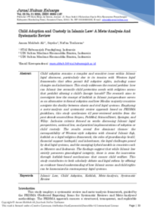Child adoption remains a complex and sensitive issue within Islamic legal discourse, particularly due to its tension with Western legal frameworks that often permit full adoptive rights, including name changes and inheritance. This study addresses the central problem: how can Islamic law reconcile child protection needs with religious norms that prohibit altering a child’s lineage? The research aims to investigate how the concept of kafalah in Islamic jurisprudence serves as an alternative to formal adoption and how Muslim-majority countries navigate the duality between sharia and civil legal systems. Employing a meta-analysis and systematic review approach based on PRISMA guidelines, this study synthesizes 42 peer-reviewed articles from the past decade. Inclusion criteria focused on works discussing Islamic legal perspectives, national law, and practical implementations of adoption or child custody. The results reveal five dominant themes: the incompatibility of Western-style adoption with classical Islamic fiqh, kafalah as a legal-religious framework, the roles of guardianship (wali), financial support (nafaqah), and inheritance, the legal challenges posed by dual legal systems, and the emerging hybrid models in countries such as Morocco and Indonesia. The findings suggest that while Islamic law strictly preserves genealogical integrity, there is room for innovation through kafalah-based mechanisms that ensure child welfare. This study contributes to both scholarly debate and legal reform by offering an evidence-based understanding of how Islamic norms and child rights can be harmonized in contemporary legal systems.

